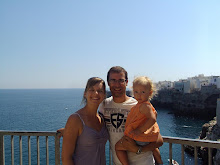I have been prompted by a friends blog to dig out some thoughts on consumerism.
Joseph McAuley has a great blog which is worth a look.
This has been very relevant to Andrea and myself while we are in Italy. We are on a reduced income which is in $NZ and spending Euro. We attempting to live frugally - at least in a different dimension to what we were in New Zealand.
Relevant magazine had a great article on consumerism some time ago. I have summarised some of it below or you can read the full article
here.
In our society, we're surrounded by the push to consume. We're constantly bombarded with the newest gadget or trinket we supposedly cannot live without. How do we combat the pull toward materialism, and what does simplicity look like in the 21st Century?
Brian McLaren: This is a major theme I’ve been exploring in recent years, because I believe these days it’s the economy, not the nation-state, that is driving the world. It would be good for people to consider the ways capitalism can become a form of idolatry.
One of the most powerful things the next generation of emerging Christians can do is be at the heart of a new global movement for ethical buying and fair trade. We can use the power of markets for good, just as they have been used for evil in so many ways—environmentally, socially and politically. It’s a question of the Kingdom of God—how would we expect economics to work in the Kingdom of God, as opposed to the systems of this world?
Steve Brown:How should we then live? With simplicity, compassion and a realization that our hearts are where our treasure is.
N.T. Wright: Money becomes a god very, very easily. So giving it away cheerfully and wisely is a step toward really saying money is not the ruling force in our lives. Money is not the thing that makes you a genuine human being. Saying that is so counterintuitive in Western culture.
Nancy Ortberg: I think every Christian should take very seriously what they do with their finances. A starting place is tithing, to give 10 percent joyfully every time you get paid, and give it back to the Church, to help the Church be the force that it should be in the world. After you’ve got the habit of tithing down, start figuring out how much is enough. I used to tell my kids, “The lower the ceiling is on enough, the happier you’re going to be.”
When you can wake up in the morning or spend your day free from needing to run to the mall or look online and buy all this stuff, you’re going to have a freedom in your spirit that’s going to be a great way to live.
Beyond yourself, figure out how much is enough, and then start thinking of serious ways in which to give away boatloads of money. Find organizations you care about that are making a difference. How do you release your money back into the world to do good when you have enough clothes in your closet and enough cars in your garage? The freedom that comes from that really teaches us a lot about God. It also teaches us there’s no end to His resources. And I’m not advocating just giving away all of your money, but when you have enough, it really becomes incumbent on us as Christians to use our money for a strong force in the world.
Cindy Jacobs: God has worked in this generation a desire to make the world a better place for all. This means grappling with issues of eliminating systemic poverty, taking care of the environment and living with each other in a kinder, more relational way.
For this reason, I believe the question is, How much is enough? We need to make wealth to steward it to create jobs, help single moms, the elderly and find ways to deal with the AIDS crisis. Our lifestyle should not be “me” centric, but “Kingdom of God” centric.





